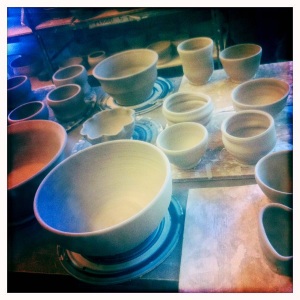“Ms. P, is this good enough?”
“What are you asking me?”
“Is this good enough for the project?”
“Hm. Do you ask that question in pre-calc?”
“Huh?”
“Because the stuff that you’re making now is going to be in the world for about six thousand years with your name on it. Don’t ask me if it’s good enough. Ask yourself. Or… go ask your math teacher.”
A colleague asked me, rhetorically, yesterday, if what we are seeking is perfection. I’m not seeking perfection. In fact, I have a whole routine on perfection – if we wanted perfect, we’d go to Target, yadda-yadda. There’s so much beauty in imperfection, in the marks of the hand, in the traces we leave behind. Our hands, our bodies, our minds, our spirits aren’t perfect, and neither are our pots – ever. Even Chris Staley’s pots aren’t perfect.
No, not perfection. Instead, raising one’s standards – that’s what I’m looking for. Or – maybe – owning one’s standards. If a student is asking me if something is “good enough,” I haven’t done my job well enough in motivating and convincing him to take ownership of his own drive and ability. When he’s taken ownership of his learning, he’ll know if “good enough” equates to the best of his ability at the time, because he’s motivated to be producing the best work of which he is capable.
Of course, “good enough” doesn’t apply to multiple choice, which is either right or wrong. “Good enough” applies to craft – and to life. It’s hard to come up with life situations and choices that closely parallel content that’s assessed with traditional testing. A day in the studio is so full of metaphors that I sometimes have to remind myself to hush about them and let students figure them out for themselves.
I’m my toughest critic, have always been so. But that’s a story for another day.








ownership….it’s a difficult concept in this world. Far easier to give the problem to someone else, let someone else take the responsibility, pawn it off on someone else. Only some day, maybe not today, but some day, we will all look in the mirror and realize that we are the someone who needs to take ownership of our work, our dreams, our opportunities and our failures…and mistakes and our successes, because in the end, we are the only someone who can…
thanks for the reminder, Ms. P….